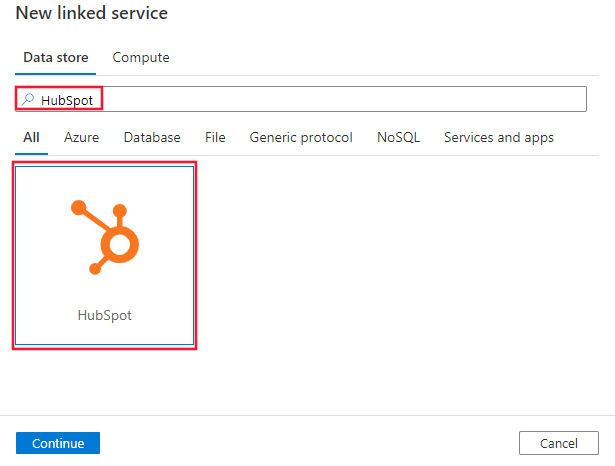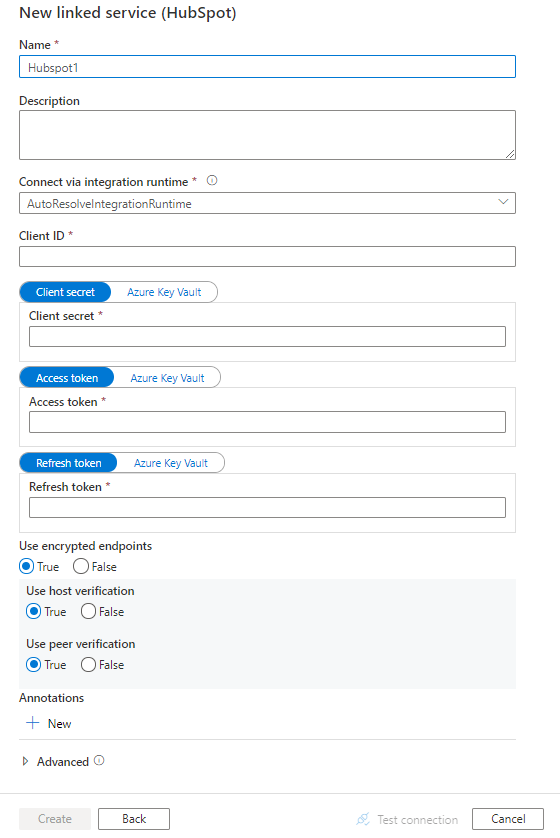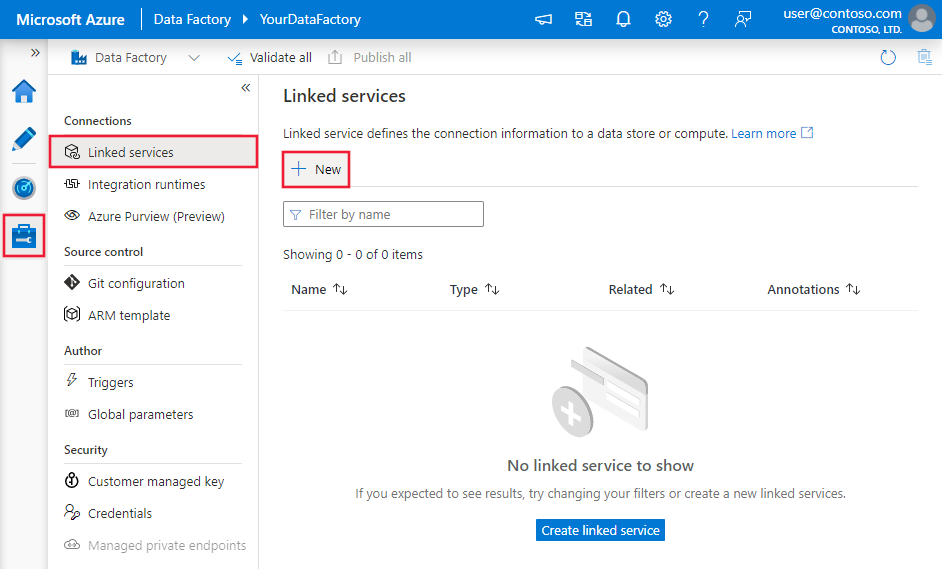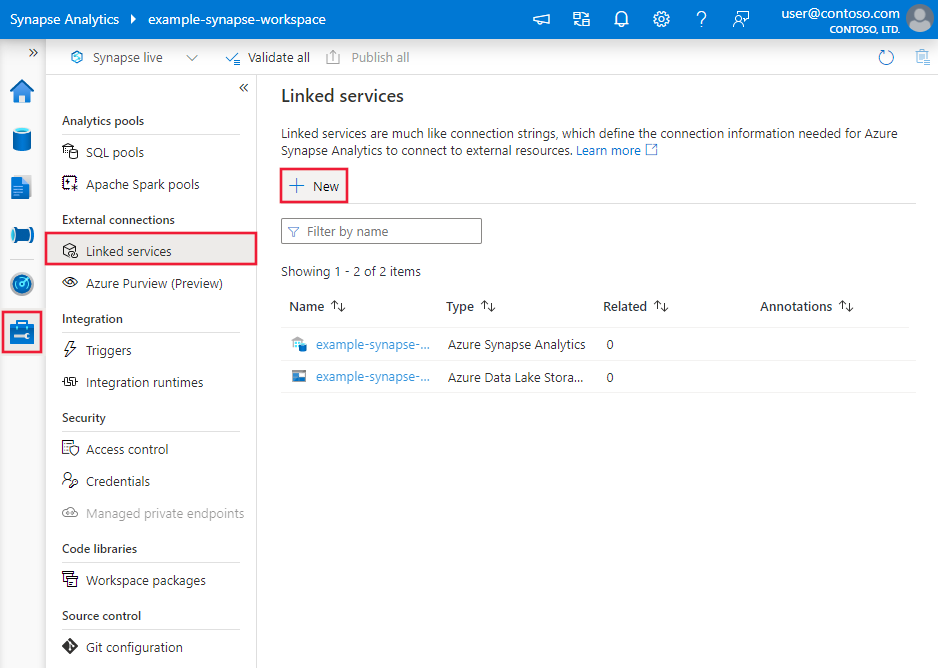Note
Access to this page requires authorization. You can try signing in or changing directories.
Access to this page requires authorization. You can try changing directories.
APPLIES TO:  Azure Data Factory
Azure Data Factory  Azure Synapse Analytics
Azure Synapse Analytics
Tip
Try out Data Factory in Microsoft Fabric, an all-in-one analytics solution for enterprises. Microsoft Fabric covers everything from data movement to data science, real-time analytics, business intelligence, and reporting. Learn how to start a new trial for free!
This article outlines how to use the Copy Activity in an Azure Data Factory or Synapse Analytics pipeline to copy data from HubSpot. It builds on the copy activity overview article that presents a general overview of copy activity.
Supported capabilities
This HubSpot connector is supported for the following capabilities:
| Supported capabilities | IR |
|---|---|
| Copy activity (source/-) | ① ② |
| Lookup activity | ① ② |
① Azure integration runtime ② Self-hosted integration runtime
For a list of data stores that are supported as sources/sinks , see the Supported data stores table.
The service provides a built-in driver to enable connectivity, therefore you don't need to manually install any driver using this connector.
The connector supports the Windows versions in this article.
Getting started
To perform the Copy activity with a pipeline, you can use one of the following tools or SDKs:
- The Copy Data tool
- The Azure portal
- The .NET SDK
- The Python SDK
- Azure PowerShell
- The REST API
- The Azure Resource Manager template
Create a linked service to HubSpot using UI
Use the following steps to create a linked service to HubSpot in the Azure portal UI.
Browse to the Manage tab in your Azure Data Factory or Synapse workspace and select Linked Services, then click New:
Search for HubSpot and select the HubSpot connector.

Configure the service details, test the connection, and create the new linked service.

Connector configuration details
The following sections provide details about properties that are used to define Data Factory entities specific to HubSpot connector.
Linked service properties
The following properties are supported for HubSpot linked service:
| Property | Description | Required |
|---|---|---|
| type | The type property must be set to: Hubspot | Yes |
| clientId | The client ID associated with your HubSpot application. Learn how to create an app in HubSpot from here. | Yes |
| clientSecret | The client secret associated with your HubSpot application. Mark this field as a SecureString to store it securely, or reference a secret stored in Azure Key Vault. | Yes |
| accessToken | The access token obtained when initially authenticating your OAuth integration. Learn how to get access token with your client ID and secret from here. Mark this field as a SecureString to store it securely, or reference a secret stored in Azure Key Vault. | Yes |
| refreshToken | The refresh token obtained when initially authenticating your OAuth integration. Mark this field as a SecureString to store it securely, or reference a secret stored in Azure Key Vault. | Yes |
| useEncryptedEndpoints | Specifies whether the data source endpoints are encrypted using HTTPS. The default value is true. | No |
| useHostVerification | Specifies whether to require the host name in the server's certificate to match the host name of the server when connecting over TLS. The default value is true. | No |
| usePeerVerification | Specifies whether to verify the identity of the server when connecting over TLS. The default value is true. | No |
Example:
{
"name": "HubSpotLinkedService",
"properties": {
"type": "Hubspot",
"typeProperties": {
"clientId" : "<clientId>",
"clientSecret": {
"type": "SecureString",
"value": "<clientSecret>"
},
"accessToken": {
"type": "SecureString",
"value": "<accessToken>"
},
"refreshToken": {
"type": "SecureString",
"value": "<refreshToken>"
}
}
}
}
Dataset properties
For a full list of sections and properties available for defining datasets, see the datasets article. This section provides a list of properties supported by HubSpot dataset.
To copy data from HubSpot, set the type property of the dataset to HubspotObject. The following properties are supported:
| Property | Description | Required |
|---|---|---|
| type | The type property of the dataset must be set to: HubspotObject | Yes |
| tableName | Name of the table. | No (if "query" in activity source is specified) |
Example
{
"name": "HubSpotDataset",
"properties": {
"type": "HubspotObject",
"typeProperties": {},
"schema": [],
"linkedServiceName": {
"referenceName": "<HubSpot linked service name>",
"type": "LinkedServiceReference"
}
}
}
Copy activity properties
For a full list of sections and properties available for defining activities, see the Pipelines article. This section provides a list of properties supported by HubSpot source.
HubspotSource as source
To copy data from HubSpot, set the source type in the copy activity to HubspotSource. The following properties are supported in the copy activity source section:
| Property | Description | Required |
|---|---|---|
| type | The type property of the copy activity source must be set to: HubspotSource | Yes |
| query | Use the custom SQL query to read data. For example: "SELECT * FROM Companies where Company_Id = xxx". |
No (if "tableName" in dataset is specified) |
Example:
"activities":[
{
"name": "CopyFromHubspot",
"type": "Copy",
"inputs": [
{
"referenceName": "<HubSpot input dataset name>",
"type": "DatasetReference"
}
],
"outputs": [
{
"referenceName": "<output dataset name>",
"type": "DatasetReference"
}
],
"typeProperties": {
"source": {
"type": "HubspotSource",
"query": "SELECT * FROM Companies where Company_Id = xxx"
},
"sink": {
"type": "<sink type>"
}
}
}
]
Lookup activity properties
To learn details about the properties, check Lookup activity.
Related content
For a list of data stores supported as sources and sinks by the copy activity, see supported data stores.

